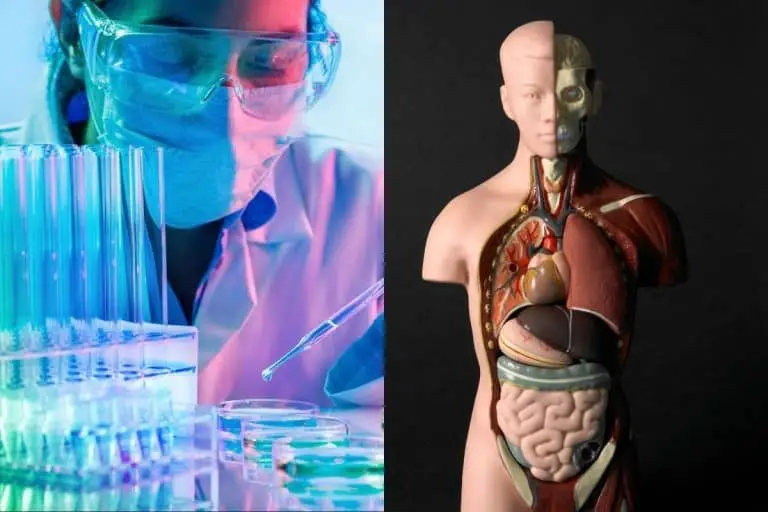History Or Geology: How To Decide Which Course To Take
Choosing a course can be daunting, and it’s a big decision that could determine what kinds of jobs you’ll find further in your life. Besides, you’re choosing a subject you’ll spend hundreds of hours with, so picking a course that interests you is key.
If you’re going into a science career, then choose geology. However, if you’re going into a career where you need to be well-versed in historical topics, then choose history. To decide which course to take, whether it be history or geology, you ultimately need to consider your career goals and interests.
If this all seems confusing, then keep reading. You’ll learn the difference between history and geology, and you’ll learn which careers use which course.

How To Decide if You Should Study History or Geology
If you’re undecided between history and geology, follow these steps to help you choose the right course for you:
- Ask yourself what kinds of subjects you enjoy the most. Geology is a physical science where you’ll have to deal with math, physics, and chemistry. History is among the humanities and will require analysis and reading comprehension.
- Check study programs. Go to the websites of universities that offer degrees in geology and history and read their programs. See which classes spark your interest the most.
- Research job outlooks. You’ll want to consider which jobs appeal to you the most before making a decision.
- Make a list of your skills. List the skills that are most valuable to you and compare them against the skills needed to be a historian or a geologist.
Why You Should Study Geology
Geology is a tremendously important field that allows us to understand the Earth like no other. Its discoveries are crucial for many physical and social sciences, from biology to economics and even history.
The course studies the structure of the solid Earth and how it has changed through time.
It’s especially concerned with rocks and the minerals they’re made of. Geology charts the evolution of the Earth throughout its 4.5 billion years of existence and how it created the landscapes we see today.
Around 3,000 different minerals make up the rocks of the Earth.
For this reason, much of geology involves analyzing the chemistry of these compounds. Another important part of this discipline is mapping the movement of rock strata through time.
Geology aims to understand the Earth at its largest scale. Rocks are an important part of it, but it also encompasses the oceans, the atmosphere, the Earth’s magnetic fields, and how they shape and are shaped by chemistry and biology.
(See my related article: Biology vs Geology – Which Is The Easier Course?)
For that reason, geology is a crucial part of preserving our planet.
Source: The Geological Society
What Geologists Do In Their Careers
The work of geologists involves fieldwork, research, and computer-based work. These are some of the primary activities you can do as a geologist:
- Logging: Geologists use logging tools to take samples of rock from below the surface.
- Laboratory work: After gathering rock samples, geologists might analyze and test them in laboratories with microscopes and other specialized tools.
- Modeling and mapping: Geologists use specialized computer programs for modeling the structure of rocks in 3D and 4D.
However, where you apply these activities also varies considerably. A geologist may apply their skills to analyzing things like:
- The atmosphere and the weather.
- Valuable resources are found inside the Earth.
- Determining the age of a rock stratum.
- The ocean and its geological dynamics.
- Earthquakes
- Geothermal energy
- The movement of tectonic plates.
- Volcanoes
- The soil and how it affects agriculture.
- Petroleum and its distribution.
Sources: The Geological Society and Louisiana State University
Career Outlook for Geology
The median pay of a geologist is $93,580 per year (source).
Overall, the job market for geologists will grow slightly during the next decade. Over time, our need for energy will keep growing and ask for new developments, and the skills and discoveries of geologists will be crucial to making advancements.
They will also play a crucial role in understanding climate change and how to deal with its consequences. Geologists can find jobs in the government and the private sectors.
These are the industries with the most opportunities for geologists:
Engineering
Engineering geologist
Geotechnical engineer
Energy
Reservoir geologist
Sedimentologist
Construction inspection
Mining
Mine geologist
Exploration geologist
Environment
Environmental geologists
Petroleum geologists
Hydrogeologists
Research
Geochemist
Geophysicist
Geoscientist
Geochronologists
Some job titles, like geoscientist or geophysicist, can be found in every industry. Industries like mining and energy need in-house geologists to perform the research required for their operations.
Wondering if you are up for a degree in Geology? See Is Geology Really Hard? Let’s Talk Facts.
Why You Should Study History
Studying history lets you understand the world through past events. The past is made of human experiences, and history lets you discover how they affect and are affected by wider developments.
History studies the records and events of the past.
To do this, historians take information from various sources like written documents, oral accounts, art, cultural artifacts, and knowledge about past events coming from many other disciplines.
History, taken at its largest, can span the whole timeline of humanity.
However, most history degrees focus on specific areas and periods. Moreover, historians specialize in particular aspects of history, like political history, cultural history, and economic history, among many others.
But history isn’t merely a matter of the past. History is one of the best ways of understanding human civilization in the present. The world is filled with different cultures, and all of them have been shaped by past events.
History conceptualizes them to give a better image of the present and what could happen in the future.
Many complex questions can only be answered by looking at the past. If you’re fascinated by a past culture, want to understand why society is organized the way it is, or simply like to know how other people used to live, then history might be the right course for you.
The Work of a Historian
The work of a historian mostly takes place in an office, in libraries, and in other institutions where they gather historical data.
These are some of the most common activities for a historian:
- Searching for historical sources. This often involves reading and selecting records from a certain period.
- Analyzing those sources. Historians look closely at artifacts and records of the past to determine their significance.
- Understanding a historical field. Historians don’t just have to deal with historical material. They also study how other historians have studied a certain period.
- Preserving and appraising historical material. Historians can determine the authenticity of an object, its value, and how it should be stored.
- Writing: Much of a historian’s work consists of creating valuable knowledge with what they discover.
Historians often specialize in specific periods. There are many areas of specialization in history, but these examples can give you an idea of what is out there:
- Ancient history
- Global history
- European history
- Asian history
- African history
- Latin American history
- Women’s history
- Cultural history
- Military history
- Economic history
- Religious history
Source: Bureau of Labor Statistics
Career Outlook for History
The median pay for a historian is $63,100 per year. However, this varies depending on the industry in which they work. The median income of a museum curator is $52,140 per year, and the median pay of a history professor in higher education is $85,630.
Not all students of history end up working as historians.
The skills that you learn in a history course make you a valuable worker in a wide variety of organizations and industries. These are some of the jobs that you can expect after completing a history course:
- Museum curator: Museums often employ historians to appraise, preserve, and create exhibitions of historical objects. They may be in charge of planning purchases or organizing a museum’s inventory.
- Historical advisors: Industries like film and publishing often seek the expertise of historians to recreate a specific period. Governments can also employ historians to analyze past policies, which in turn influences decision-making in the present.
- Academic historian: Students of history can stay in academia to perform research and analysis and create historical records. This usually involves writing books and articles.
- Journalist: Much of investigative journalism involves some historical accounts. Also, many journals feature pieces about history.
- Writer: The knowledge of historians can make them excellent writers for media like magazines, documentaries, non-fiction books, or even fiction.
- History teacher: A degree in history can let you become a history teacher in either a K-12 school or higher education. However, teaching in universities usually requires a post-graduate degree.
- Lawyer/legal assistant: Many law firms employ historians to gather data from historical law documents and analyze previous cases.
- Librarian: The organizational skills and knowledge of sources a historian has can make them a great librarian.
Sources: Norwich University, Prospects, and Bureau of Labor Statistics
History or Geology: Which One Suits You Better?
Now that you know a little more about history and geology courses and the jobs you can get with these courses, let’s now discuss how you can choose between the courses.
Useful Skills In History
A good historian has great analytical and critical thinking skills and is reflective and responsible about how they handle information. If you want to become a historian, you should be comfortable with reading long texts attentively.
These are some of the skills that will significantly help you become a historian:
- Research skills: A historian’s job relies on finding relevant information from primary sources way beyond what can be found in a textbook. This involves a lot of thorough searching in records and artifacts from the past.
- Interpretative skills: There’s no one way of interpreting a historical event. Historians will often debate about what is the right way to answer a historical question. To become a historian, you’ll need to interpret the accounts of others and arrive at your own conclusions.
- Creativity and empathy: As a historian, you’ll have to try to understand the motivations of people of the past. These motivations can be wildly different from our own because their environment was radically different. You’ll need to think creatively and put yourself in the shoes of very distant and different people.
- Learning skills: As you study history, you’ll find yourself delving into many different unfamiliar periods. An ability to learn quickly and on your own will be of great value.
- Writing skills: The result of the work of a historian usually becomes a written essay or a book. In a history course, you’ll need to write with proficiency and in an engaging way.
- Languages: Being able to read other languages can dramatically expand your possibilities as a historian. You’ll be able to access a new wealth of historical records.
Source: American Historical Association and London School of Economics and Political Science
Useful Skills in Geology
In Geology, you’ll develop a variety of technical and analytical skills. However, many other kinds of skills will give you a considerable advantage as a geologist.
Here are some of the skills you’ll need to work as a geologist:
- 3D and 4D modeling: Geologists will often use specialized software to create visual models of rock formations.
- Good spatial skills: As a geologist, you’ll work with enormous objects that move slowly through time. You won’t be able to see them directly, so you’ll need to be able to imagine them.
- Analytical abilities: As in other sciences, you’ll have to do research and extract useful analysis from it.
- Fieldwork: Being able to work in the field and use field tools will be highly valuable in many industries.
- Languages: The corporations that employ the most geologists, like those in the mining and energy industries, are usually international. Speaking another language will be extremely useful and will make you more valuable as a geologist.
- Communication skills: A geologist will often have to write reports with crucial information for other operations or divulgation. For this reason, you’ll need to be able to communicate complex ideas clearly.
- Cross-disciplinary teamwork: Geologists usually work with professionals from other fields, like engineers, computer scientists, biologists, and physicists.
To Summarize
Now that you’ve familiarised yourself with both history and geology, you’ll be able to make a better decision on which one to take. Check university programs for these courses and see which ones catch your attention the most.
The ideal course for you will also depend on the kind of job you expect to get from it. Geologists can work as researchers or in industries like mining and energy. Historians often work in teaching, journalism, law, and communications.
Finally, consider your skills and how well they align with the skills related to history and geography.






